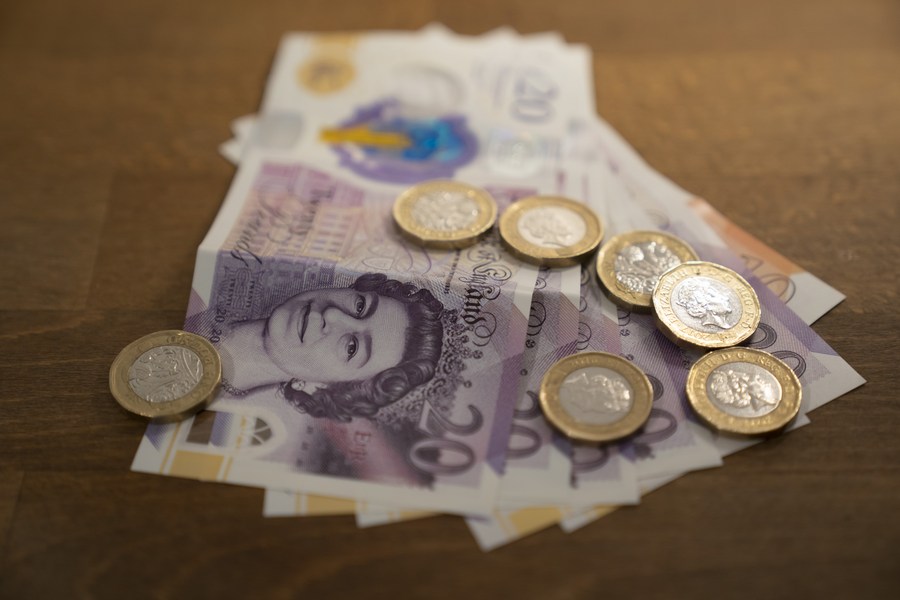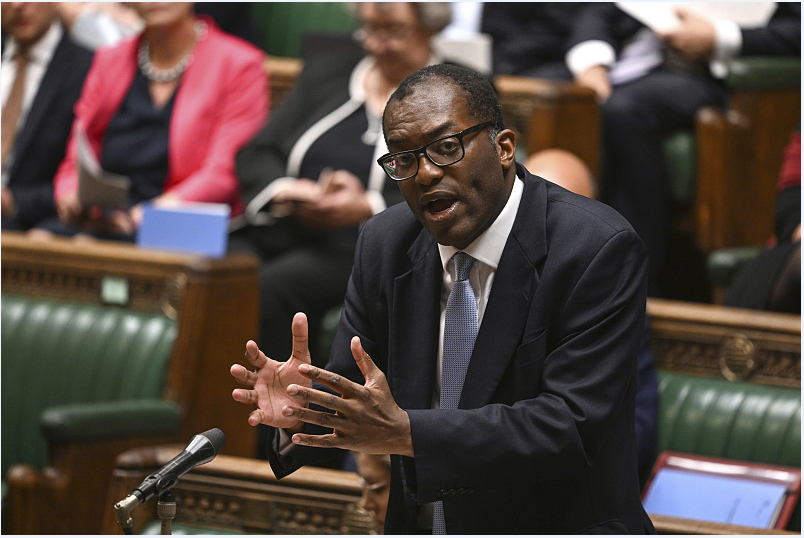
Notes and coins are seen in a family in Manchester, Britain, March 18, 2022. /Xinhua)
Notes and coins are seen in a family in Manchester, Britain, March 18, 2022. /Xinhua)
Editor's note: Thomas W. Pauken II is the author of "U.S. vs China: From Trade War to Reciprocal Deal," a consultant on Asia-Pacific affairs and a geopolitical commentator. The article reflects the author's opinions and not necessarily the views of CGTN.
The United Kingdom's currency, the pound, had a steep fall in value compared to the United States dollar on Monday, hitting an all-time low at $1.0327 before rebounding to $1.0605 by mid-day in the market's session. The pound has struck at its lowest levels since 1985.
Both the sterling and the euro have trended lower in recent months and there's little likelihood of seeing the trends reversed in the near future. The euro dropped below parity to the U.S. dollar at $0.9647 on Monday, a 20-year low.
The UK and European Union economies are slumping and the regional financial conditions are only getting worse. It's as if the news updates for Europe keep getting worse with each passing day.
The continent continues to confront increasing challenges, such as sky-high inflation rates, severe disruptions of supply chains, and impending food and energy shortages, while the ongoing Ukraine-Russia war places Europe's security in greater peril.
Accordingly, the British pound can't avoid a pummeling in values against the U.S. dollar. Nonetheless, British manufacturers and exporters can benefit, since UK exports to the U.S. can be sold cheaper to American consumers. Yet, British consumers get harder hit as imports to the UK get more expensive.

United Kingdom Parliament, Britain's Chancellor Kwasi Kwarteng speaks in the House of Commons in London, September 23, 2022. /CFP
United Kingdom Parliament, Britain's Chancellor Kwasi Kwarteng speaks in the House of Commons in London, September 23, 2022. /CFP
Blaming lower tax rates not accurate
By reviewing Western media reports, the articles are mainly saying that UK Prime Minister Liz Truss's support for large tax cuts had sparked the dramatic drop of the British pound. The British Chancellor of the Exchequer, Kwasi Kwarteng introduced his mini-budget last Friday calling for the largest reductions in income and corporate taxes for the UK since 1972.
Truss and her cabinet argue that the proposals can "turbo-charge" the UK economy, while staving off a deep recession. But her critics contend the tax cuts will lead to much higher public debt, while the UK's inflation rate hit 9.9 percent in August and it could surge to double digits very soon.
Well, both Truss and her skeptics hold valid arguments but as the saying goes, "desperate times require desperate actions," so London has to take unprecedented measures to bolster the UK economy. Additionally, the UK's central bank, the Bank of England has hinted they might call an emergency meeting this week to raise interest rates again, ahead of schedule.
The central bank of a country raising its benchmark interest rates can boost the value of the nation's currency. The U.S. dollar has begun to soar higher compared to many other global currencies after the Federal Reserve started to raise its interest rates earlier this year.
In other words, the Federal Reserve's rate hikes have spurred the pound's decline more so than anything else. Perhaps, the announcement of the UK tax cuts served as only a trigger to spark worries but Truss has no better option in efforts to restore confidence to the domestic economy.
Biden benefits from strong U.S. dollar
The U.S. mid-term elections loom ahead in early November and it seems very likely that the ruling Democrat Party could lose majority control of the U.S. Congress, with high chances for the opposition Republican Party to regain control of the U.S. Senate as well. According to most American voters' opinion polls, concern over high inflation rates is the top priority issue for them.
A strong U.S. dollar keeps imported prices lower and American consumers will start to notice it when shopping. Americans also benefit when they travel to foreign countries, such as the UK, when exchanging currencies. U.S. manufacturers with factories in overseas markets can score bigger profits when importing their products back to the U.S.
Nonetheless, the UK cannot sustain a prolonged weaker pound since it leads to higher costs in paying back public debts, as well as heightening instability of the domestic economy. The UK does not have a strong manufacturing and exports base, whereas Japan is a major exporter to the U.S. and would be better positioned to deal with a higher U.S. dollar.
Truss should push ahead with tax cuts
The prevailing consensus is that PM Truss blundered by reaffirming support for big tax cuts in the UK. But why not favor tax cuts when Europe is confronting such gloomy economic conditions?
The British would have more money in their pockets. Let the people decide how to spend their own money. Many people would appreciate paying lower taxes if they could.
Hence, we should anticipate the British pound going lower and some experts are forecasting that this currency could drop below parity (1.00 to 1.00) to the U.S. dollar by the end of the year. It's obvious, the US Federal Reserve will continue to raise its benchmark rates for the rest of the year and Biden wants to curb inflation in the U.S. to improve Democrats' chances for the upcoming Mid-terms.
London will have little influence over Washington's actions, so Truss has to remain focused on improving the UK economy most of all.
(If you want to contribute and have specific expertise, please contact us at opinions@cgtn.com. Follow @thouse_opinions on Twitter to discover the latest commentaries on CGTN Opinion Section.)

